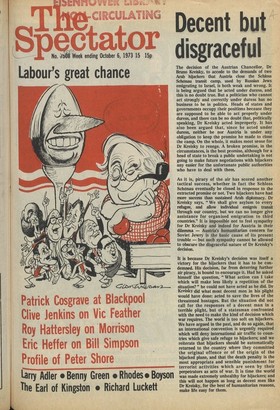Decent but disgraceful
The decision of the Austrian Chancellor, Dr Bruno Kreisky, to accede to the demands of two Arab hijackers that Austria close the Schloss SchOnau transit camp, used by Russian Jews emigrating to Israel, is both weak and wrong. It is being argued that he acted under duress, and this is no doubt true. But a politician who cannot act strongly and correctly under duress has no business to be in politics. Heads of states and governments occupy their positions because they are supposed to be able to act properly under duress, and there can be no doubt that, politically speaking, Dr Kreisky acted improperly. It has also been argued that, since he acted under duress, neither he nor Austria is under any obligation to keep the promise he made to close the camp. On the whole, it makes most sense for Dr Kreisky to renege. A broken promise, in the circumstances, is the best promise, although for a head of state to break a public undertaking is not going to make future negotiations with hijackers any easier for the unfortunate public authorities who have to deal with them.
As it is, piracy of the air has scored another tactical success, whether in fact the Schloss SchOnau eventually be closed in response to the extracted promise or not. Two hijackers have had more success than sustained Arab diplomacy. Dr Kreisky says, "We shall give asylum to every refugee, and allow individual emigres transit through our country, but we can no longer give assistance for organised emigration to third countries." It is impossible not to feel sympathy for Dr Kreisky and indeed for Austria in their dilemma — Austria's humanitarian concern for Soviet Jewry is the basic cause of its present trouble — but such sympathy cannot be allowed to obscure the disgraceful nature of Dr Kreisky's decision.
It is because Dr Kreisky's decision was itself a victory for the hijackers that it has to be condemned. His decision, far from deterring further air piracy, is bound to encourage it. Had he asked himself the question, "What action can I take which will make less likely a repetition of the situation?" he could not have acted as he did. Dr Kreisky did what most decent men in his plight would have done: acted to save the lives of the threatened hostages. But the situation did not call for the responses of a decent man in a terrible plight, but of a statesman confronted with the need to make the kind of decision which war requires. The world is too soft on hijackers. We have argued in the past, and do so again, that an international convention is urgently required which will deny international air traffic to countries which give safe refuge to hijackers; and we reiterate that hijackers should be automatically returned to the country where they committed the original offence or of the origin of the hijacked plane, and that the death penalty is the most appropriate and sensible punishment for terrorist activities which are seen by their perpetrators as acts of war. It is time the world was made extremely unhealthy for hijackers; and this will not happen as long as decent men like Dr Kreisky, for the best of humanitarian reasons, make life easy for them.


































